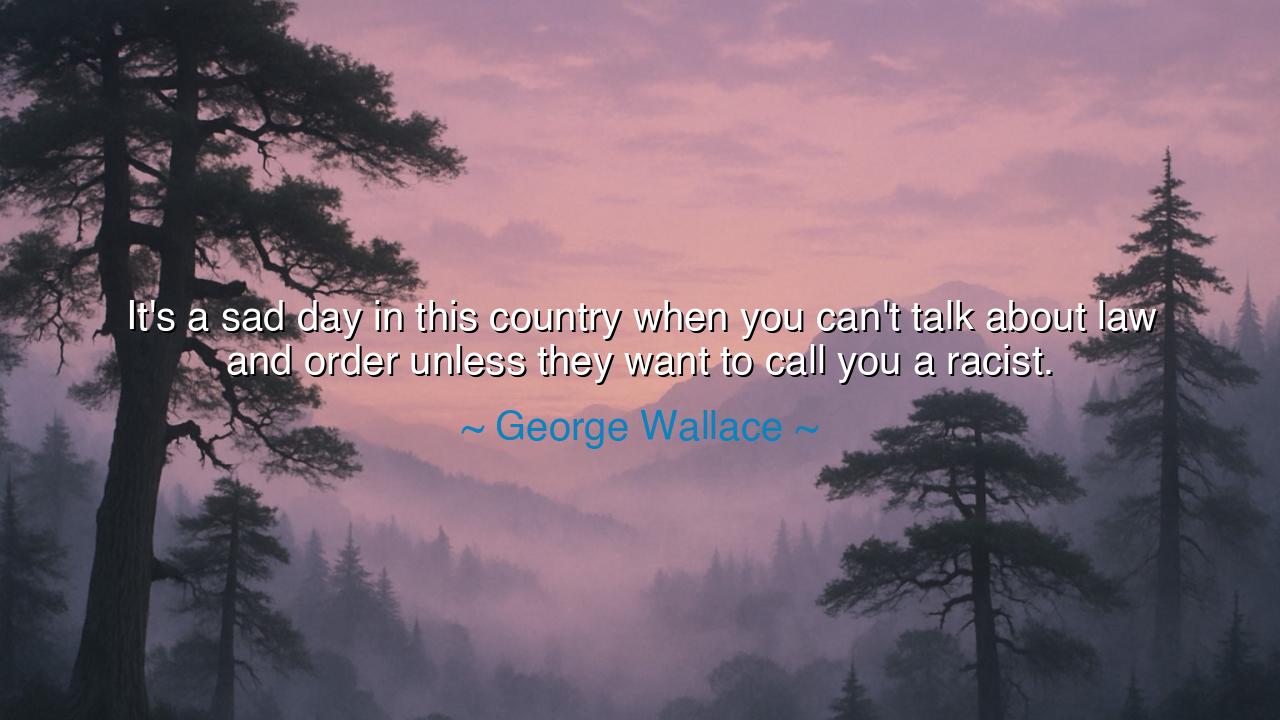
It's a sad day in this country when you can't talk about law and
It's a sad day in this country when you can't talk about law and order unless they want to call you a racist.






The words of George Wallace, “It’s a sad day in this country when you can’t talk about law and order unless they want to call you a racist,” rise from one of the most turbulent and painful eras of American history. They were spoken by a man whose name became synonymous with division — a governor of Alabama who once stood in the doorway of a school to block integration, who proclaimed “segregation forever,” and who later, in his twilight years, sought repentance for the wounds his words had deepened. This quote, layered with both defensiveness and sorrow, reflects a moment when the nation was being torn between two visions of justice — one rooted in fear and control, the other in equality and liberation. To understand its meaning is to look into the paradox of power and conscience, where the rhetoric of “law and order” became a battlefield for the soul of a country.
In its origin, this statement was not born from wisdom but from conflict. The 1960s were ablaze with marches, riots, and revolutions of conscience. The Civil Rights Movement demanded dignity and equality for Black Americans, while those who feared change cloaked their resistance in the language of “law and order.” Wallace, a master of populist speech, wielded this phrase to appeal to those anxious about social upheaval — to those who saw justice for one group as chaos for another. To him, the accusation of racism was an unjust attack, and thus he cried out in wounded pride. But to history, his lament reveals something deeper: the way moral blindness often hides behind the language of order and safety.
To the ancients, this struggle between justice and order was a sacred one. Plato wrote that true order cannot exist without justice, for when power enforces peace through fear, the soul of the state rots from within. Wallace’s lament — that he could not speak of “law and order” without being called a racist — reveals how his idea of order was separated from compassion. For order without empathy is tyranny; law without equality is oppression. The wise must remember that when peace is bought by silencing the suffering, it is not peace at all, but a fragile illusion — like a still lake covering the fire beneath.
Yet, within the sorrow of Wallace’s words lies a cautionary truth. There are times when societies fracture because language itself becomes poisoned. Words that once carried noble intent — like “law,” “order,” “freedom,” or “justice” — can be twisted by fear, mistrust, and political ambition. When that happens, communication breaks down; people stop hearing one another. Wallace’s statement, however flawed in spirit, reminds us that language must always be cleansed by truth. To speak of law and order without addressing the injustices that create disorder is hypocrisy; but to silence every discussion of law because of its misuse is equally dangerous. Wisdom lies not in silence, but in reclaiming words for their righteous purpose.
History offers us an image of transformation that mirrors this lesson. In his later years, George Wallace, broken by an assassination attempt and confined to a wheelchair, sought forgiveness from those he had once wronged. He met with Black leaders, including those he had once defied, and publicly repented for his past. Whether his contrition was perfect or not, it revealed that even the most rigid hearts can learn that true law and order begin within the soul — in humility, compassion, and the recognition of shared humanity. In that transformation, his once-defensive words became a mirror reflecting a nation’s journey from denial toward reckoning.
To the wise, the quote stands as a reminder that law and order must serve life, not the other way around. When a people use those words to justify cruelty, oppression, or indifference, they betray the very foundation of civilization. But when law protects the weak, and order defends the dignity of all, it becomes sacred — a divine harmony between strength and mercy. The ancients would say that justice is the balance of the cosmos, and that the ruler who disturbs it, no matter how noble his intentions, brings ruin upon himself and his city.
The lesson, then, is both eternal and urgent: guard your words, for they shape the world you build. Do not let fear disguise itself as righteousness, nor let righteousness turn into scorn. Seek truth beyond the noise of accusation and defense. When you speak of justice, let it be with compassion; when you uphold order, let it be for the sake of peace, not power. Remember that the strength of a nation lies not in how it punishes, but in how it heals. For as Wallace’s story reveals, it is a sad day indeed — not when words are misunderstood — but when hearts refuse to see that true order is born only from justice, and justice only from love.






AAdministratorAdministrator
Welcome, honored guests. Please leave a comment, we will respond soon